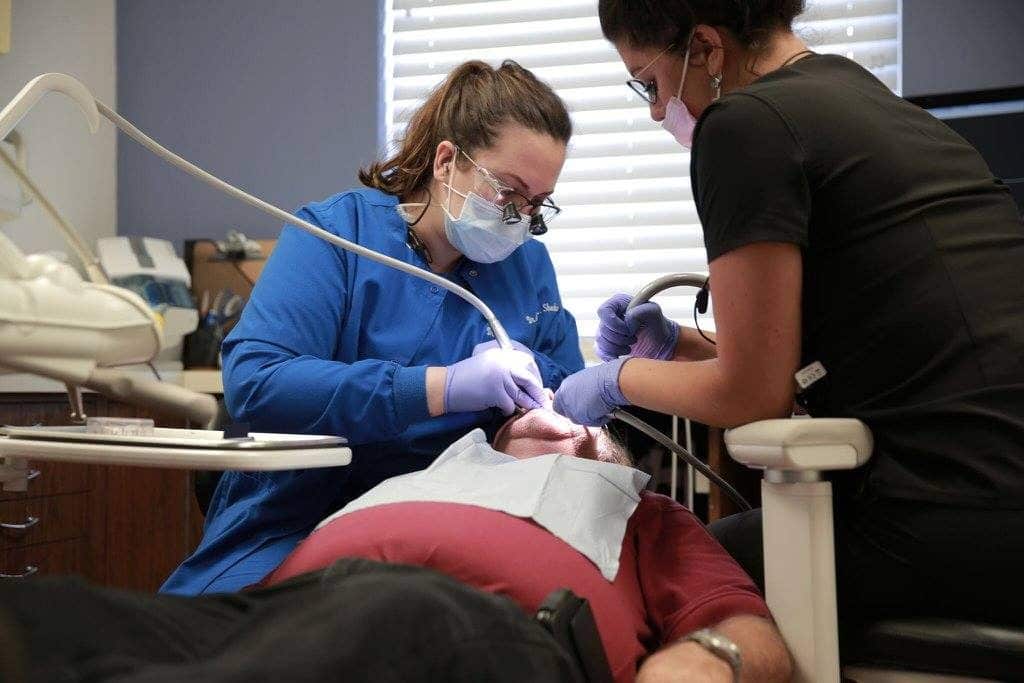How to Know When to Visit Our Waterford Office for Wisdom Teeth Removal
If you’re experiencing pain, swelling, or jaw discomfort, your wisdom teeth may be the culprit. At Oakland Family Dental in Waterford, MI, Dr. Amanda Sheehan provides guidance on when it’s time to consider wisdom tooth removal. While not everyone needs their wisdom teeth extracted, issues like impaction, crowding, or infection can make removal necessary.
Whether you live in Waterford or nearby areas like Clarkston, West Bloomfield, White Lake, or Pontiac, you deserve treatment from the best dentist near you. Dr. Sheehan and her caring team are known for being a top choice when searching for a dentist in Waterford, offering personalized care that makes every visit stress-free. If you’re unsure if it’s time to remove your wisdom teeth, contact our Waterford dental office by calling (248) 674-0384.

Excellent Care You Can Count On
At Oakland Family Dental, patients aren’t just treated—they’re cared for like family. Justin A., a loyal patient, shares his experience:
- “I love the staff here. They treat you like family and they always give it 110%. I first came here for a toothache. They had me hooked with how kind and honest they were with me and best approaches for further appointments. Without a doubt the best dentistry office and best staff hands down that I have ever witnessed.”
This level of compassion and trust is what sets Dr. Amanda Sheehan apart as the best dentist in Waterford. Whether it’s a routine checkup or something more complex like wisdom tooth removal, her team ensures every patient feels confident, informed, and supported.
Wisdom Teeth Growth
Wisdom teeth, also known as third molars, typically emerge in late adolescence or early adulthood, between the ages of 17 and 21. In some cases, wisdom teeth may not grow properly, leading to a condition known as impaction. Impacted wisdom teeth can cause significant structural issues in the jaw, displace other teeth, and have a detrimental effect on the strength and health of the jaw.
However, not all wisdom teeth need to be removed. Some people have healthy wisdom teeth that grow properly and don’t cause any issues. In these cases, wisdom teeth management may involve regular dental check-ups and diligent oral hygiene practices to ensure their continued health.
Types of Impacted Wisdom Teeth
Tooth impaction occurs when a tooth doesn’t fully emerge from the gums. Wisdom teeth, located at the back of your mouth, can become impacted at different angles:
- Vertical impaction
- Horizontal impaction
- Distal impaction
- Mesial impaction
Given the various angles and levels of impaction, consulting with an experienced dentist or oral surgeon for an assessment of your wisdom teeth is key to determining the appropriate course of action for your specific case.
Signs Indicating the Need for Wisdom Teeth Removal
If you’re experiencing any of the following signs, contact our board-certified Waterford dentist today to schedule an appointment.
Persistent Pain and Discomfort
One of the most common issues associated with wisdom teeth is persistent pain and discomfort. You may experience any of the following:
- Red or swollen gums
- Tender or bleeding gums
- Jaw pain
- Swelling around the jaw
- Bad breath
- Gum disease
- Bacterial buildup in broken gums
- Impacted tooth
- Tooth decay
Inflammation and Infection
Inflammation and infection are critical signs indicating the need for wisdom teeth removal. Oral inflammation is often caused by wisdom teeth breaking through the gum line and impacting the surrounding gum tissue. Potential risks associated with wisdom teeth inflammation include oral cysts, which can be fluid-filled, sinus issues, and gum disease. The possible consequences of wisdom teeth inflammation include discomfort, edema, and infection, which can also affect nearby teeth.
Tooth Crowding and Damage
Tooth crowding and damage caused by wisdom teeth can lead to shifting teeth, overbite/underbite, and decay. Keeping wisdom teeth that cause such issues may result in painful dry sockets, infection, bleeding, swelling, and pain.
If your dentist notices that your wisdom teeth are causing tooth crowding or damage, it’s crucial to consider their removal to maintain your overall oral health. Early intervention can prevent more severe complications that may require extensive dental treatment.
Factors Affecting the Decision to Remove Wisdom Teeth
 Age
Age
Dentists recommend wisdom teeth removal at a younger age — typically between the ages of 18 and 24 — to avoid complications that may arise from the bone and tooth roots being fully formed. Extracting wisdom teeth at an earlier age, when only two-thirds of the roots have formed, is advantageous as healing typically progresses more quickly after the procedure.
Wisdom teeth removal can be performed at any age, and the decision should be based on individual circumstances and the advice of your dentist or oral surgeon.
Oral Health
Poor oral health can potentially increase the risk of complications during the procedure. Before the procedure, our dentist will ensure that you’re in good overall oral health. Maintaining proper hygiene post wisdom teeth removal is also vital for preventing complications and ensuring a smooth recovery.
Orthodontic Considerations
If a patient is receiving orthodontic treatment, an orthodontist might recommend the removal of wisdom teeth to prevent any potential future alignment issues or to create space.
Prophylactic Removal
Some dental professionals recommend the removal of wisdom teeth even if they aren’t currently causing problems. The rationale is that potential complications can be avoided, and younger patients might recover from the procedure more quickly than older individuals.
Frequently Asked Questions
Wisdom tooth removal is usually a painless procedure and most people experience little to no pain after surgery. Typically, there’s some mild discomfort and swelling for 3 to 4 days following the extraction.
It depends. Some people’s wisdom teeth come in without any issues and don’t need to be removed. However, it’s essential to maintain regular dental check-ups. Dentists can monitor the growth and position of wisdom teeth using X-rays to predict potential problems before they arise. If your dentist foresees future issues like impaction or misalignment, they might recommend a proactive removal.
Trust Our Top Waterford Dentist for Wisdom Tooth Care That Puts You First
Knowing when to remove your wisdom teeth can protect your smile and prevent more serious oral health issues. If you’re dealing with discomfort or have concerns about your wisdom teeth, Dr. Sheehan can help. Trusted by patients across Waterford and nearby areas like Auburn Hills, Bloomfield Hills, and Highland Township, Dr. Sheehan is consistently recognized as a top dentist in Waterford.
Schedule your consultation with our Waterford dentist by calling (248) 674-0384. Your dental health deserves quality care and a team that truly treats you like family.

